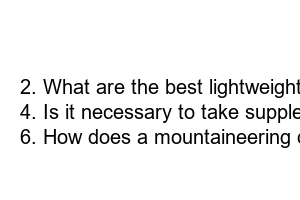등산 다이어트 효과
Title: Fueling the Climb: The Impact of a Mountaineering Diet
Introduction:
Embarking on a mountaineering adventure requires mental strength, physical endurance, and strategic planning. One key aspect that often gets overlooked is the mountaineering diet. What we consume greatly influences our performance, energy levels, and overall well-being during these arduous expeditions. In this blog post, we will explore the effects of a mountaineering diet and how it can optimize your performance in these challenging landscapes.
1. The Importance of Balanced Nutrition:
A mountaineering diet must be carefully crafted to provide essential nutrients and maintain optimal energy levels. With high-intensity physical exertion, climbers require a balance of macronutrients – proteins, carbohydrates, and fats – to fuel their bodies efficiently and enhance muscle recovery and growth.
2. Carbohydrates as the Primary Fuel Source:
Carbohydrates form the most significant part of a mountaineer’s diet, as they serve as the primary energy source during exercises. Incorporating whole grains, fruits, and vegetables that are rich in complex carbohydrates helps sustain energy levels and prevents fatigue.
3. Lean Proteins for Muscle Repair and Recovery:
Mountaineering puts immense strain on muscles, and consuming lean proteins such as poultry, fish, beans, and nuts is crucial for muscle repair and recovery. *These proteins contain essential amino acids that aid in the growth and repair of muscle tissues, supporting post-climbing recovery and minimizing the risk of injury.
4. The Role of Fats:
Contrary to popular belief, fats are not the enemy. In fact, they are a vital part of a mountaineering diet. Healthy fats found in avocados, nuts, and olive oil provide long-lasting energy, promote heart health, and aid in the absorption of vital nutrients.
5. Hydration – The Key to Endurance:
Maintaining proper hydration levels is crucial during mountaineering trips. *Dehydration can lead to decreased performance, muscle cramps, and even altitude sickness. Drinking enough water, supplemented with electrolyte-rich beverages, prevents these issues and supports optimal physical functioning.
6. Snacking Strategies for Sustained Energy:
Frequent snacking during mountaineering is essential to keep energy levels steady. Lightweight, high-calorie snacks such as energy bars, dried fruits, and nuts provide a quick energy boost on the go. *Planned snack breaks give climbers the opportunity to refuel and replenish their bodies.
7. The Impact of Altitude:
Altitude affects climbers in unique ways, making adequate nutrition even more critical. It is common to experience a decreased appetite at higher elevations, but maintaining a mountaineering diet becomes even more vital. High-calorie foods and beverages such as soups, smoothies, and energy gels can help ensure sufficient caloric intake and sustain energy levels.
Summary:
A carefully curated mountaineering diet is essential for optimal performance, endurance, and overall well-being during climbs. By incorporating adequate amounts of carbohydrates, lean proteins, healthy fats, and staying thoroughly hydrated, climbers can enhance their physical and mental capacities while minimizing the risk of fatigue, muscle injuries, and altitude-related issues. Plan your diet strategically, pack lightweight yet nutrient-dense snacks, and embark on your mountaineering journey with confidence. Remember, being well fueled is the key to conquering the peaks with commendable strength and resilience.
FAQs:
1. What should I eat before a mountaineering expedition?
2. What are the best lightweight snacks for mountaineering?
3. How can I combat a loss of appetite at high altitudes?
4. Is it necessary to take supplements during a mountaineering trip?
5. Are there specific food items to avoid while mountaineering?
6. How does a mountaineering diet differ from everyday nutrition?

